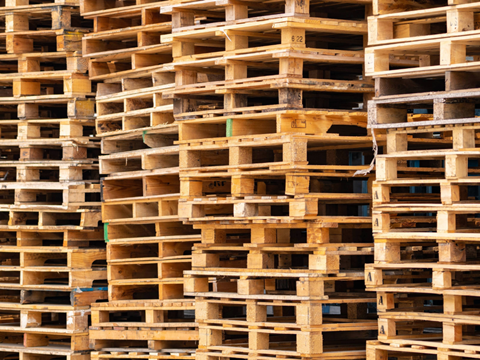
According to the European Federation of Wooden Pallet and Packaging Manufacturers (FEFPEB), the incoming EU Deforestation Regulation (EUDR) will not have significant impacts on customers transporting products with wooden packaging and pallets.
The regulation will require businesses to provide evidence that products sold on the EU market were not sourced from recently deforested land and have not contributed to the degradation of forests.
The Federation’s secretariat explained in a newsletter delivered to FEFPEB members that wooden packaging would only be held to the EUDR’s rules when it was placed on the market for the first time as a standalone product. Once it had been used, its status would change.
Additionally, selling or renting used packaging material to other companies, as is the case in pallet pooling systems, does not fall under the scope of the EUDR.
“As soon as the pallet or packaging is used to support, protect or carry another product, it is no longer covered by the EUDR, even if it is listed separately on the invoice of a product or when it is returned by a retailer to its supplier,” the organization stated. “Once the concerned packaging becomes a packaging material used exclusively as packaging material to support, protect or carry a product, it is then not covered by the scope 27 of the Regulation.
“Similarly, empty packaging material already used for the first time to support, protect or carry another product, for instance when traded within a closed loop exchange system (i.e., pallets transferred from one company to another to be reused for transport) is not covered by the Regulation.”
Fons Ceelaert, secretary general at FEFPEB, added: “FEFPEB’s membership and association pooling businesses are fully supportive of EUDR’s aims to protect forests around the world. We have produced this guidance to share with customers and the supply chain to give clarity on the implications of these regulations.”
Earlier this year, the European Commission announced its intent to simplify the EUDR, cutting down on administrative burden and costs by 30%. Its Frequently Asked Questions and guidance were updated as the law is set to enter into application in 2025.
In other legislative news, European Plastics Converters (EuPC), IK Industrievereinigung Kunststoffverpackungen (IK), and Elipso have signed a document arguing that plastic pallet wrappings and straps for transporting products should be exempt from reuse obligations under the Packaging and Packaging Waste Regulation (PPWR) – arguing that they already contain post-consumer recyclate, are fully recyclable, and cannot yet be replaced by an effective alternative material.
Several MEPs have also asserted that the PPWR’s reuse quotas for industrial packaging offer ‘no practical reuse solutions’ for pallet wrappings and straps, suggesting that holding them to reuse quotas could ‘jeopardize important supply chains throughout Europe’.
If you liked this story, you might also enjoy:
The ultimate guide to the Packaging and Packaging Waste Regulation in 2025
How are the top brands progressing on packaging sustainability?
Everything you need to know about global packaging sustainability regulation in 2025
The key to increasing the use of reusable packaging in supermarkets














No comments yet